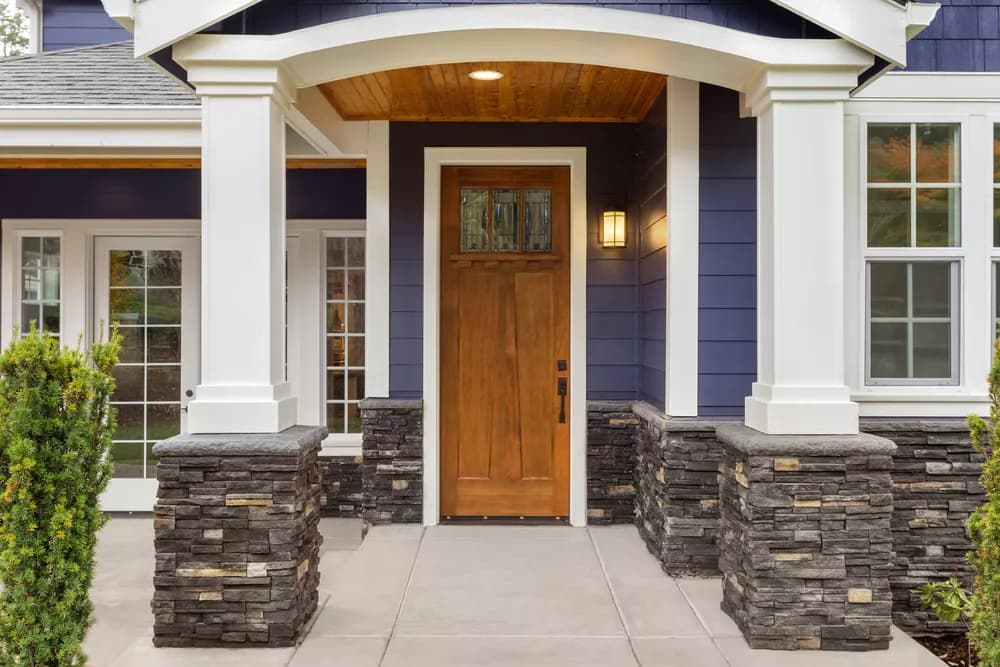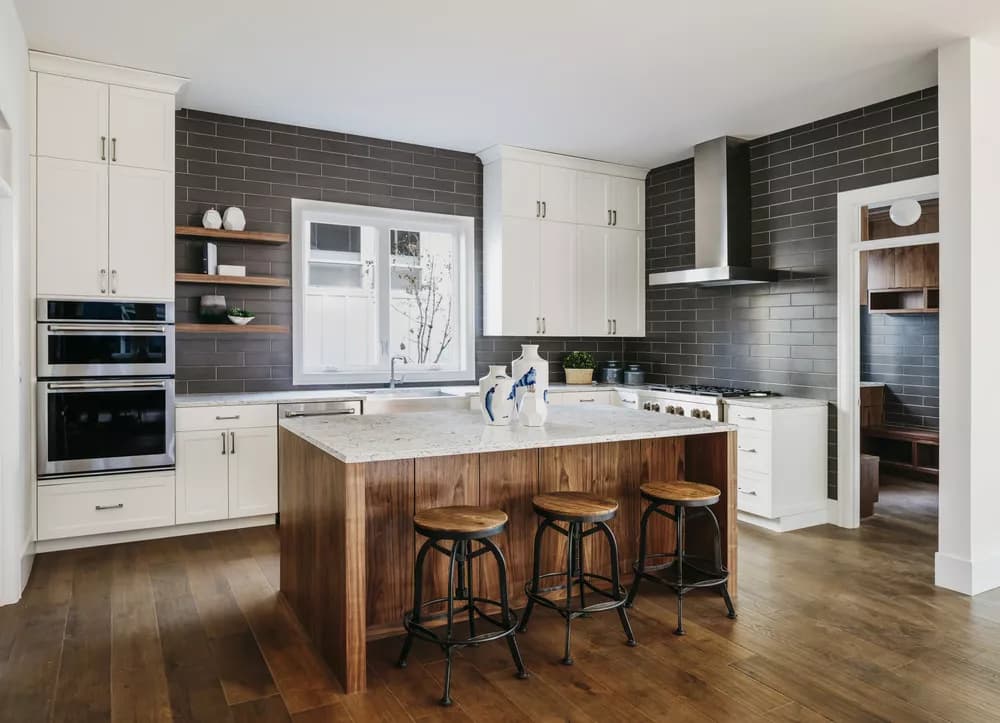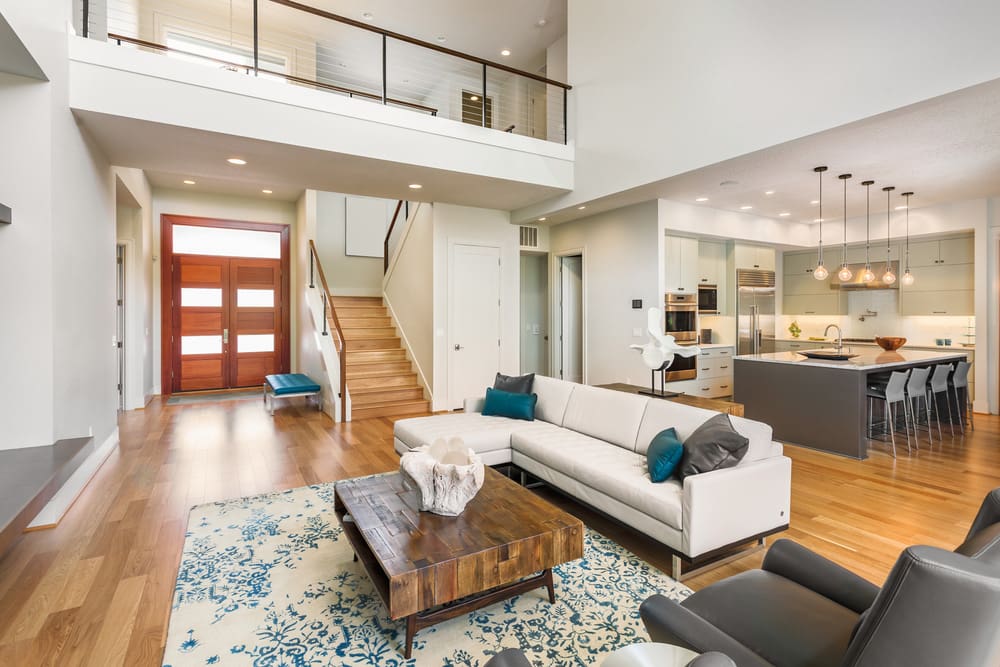Whether it’s to increase square footage or increase home value—if you’re renovating your home, you’ll probably want a contractor. But before signing a home renovation contract, it’s important to take time selecting a contractor who’s right for the job. Check out these 15 questions to ask contractors before hiring!
What’s Your Background?
When considering a contractor for hire, determine how many years of contracting experience they have to get a better idea of their ability to remodel your home. Ask about the number of projects they completed over the years to gain more insight into their preparedness and project execution. In addition, you’ll want to look at the contractor’s portfolio to see if they’ve done projects like yours in the past. A portfolio can also demonstrate the contractor’s work quality and overall technical ability.
Are You Licensed for This Type of Project?
Hiring a licensed contractor for a bathroom remodel or kitchen upgrade has many benefits. Not only are licensed contractors trained and aware of local and federal building requirements, but they’re more likely to take responsibility for any errors to maintain their reputation and keep their credentials. Hiring a licensed contractor can also protect you from potential litigation or financial obstacles in the future. If you hire a contractor without a license, you’ll be on your own when it comes to resolving any unfinished projects, payment issues, and/or legal disputes.
There are several ways to verify a contractor’s license to do home remodeling work.
- Check to see if they’re an accredited Better Business Bureau contractor, as they’re required to be licensed and insured.
- Verify their trade license number with your state’s licensing board website, as regulations vary by state.
Will You Obtain All Required Permits?
Obtaining any required remodeling permits during a major home remodel is crucial. It’s a good sign of trust if a contractor pulls the permits for you, as the person who grabs the required building permits will be responsible for the project and must answer to inspectors. That said, if a contractor pressures you into getting the permits yourself, this could be a sign they’re trying to avoid inspection. Plus, if the contractor obtains the permits, their insurance will cover damages, whereas if you pull the permits, then you’ll be responsible for the cost of required repairs. Building codes and permit costs vary by state, so take time to talk with your contractor about the local standards.
What Kind of Insurance Do You Have?
One of the first questions to ask a contractor is if they (and their employees) are insured. Contractor insurance requirements vary from state to state, contractors are generally recommended to obtain some form of insurance. Although subcontractors are not legally required to be insured, it’s still recommended they carry insurance for financial protection. Check to see if your contractor has liability insurance, property damage insurance, and workers’ compensation. If you end up hiring a contractor without insurance, you’ll be setting yourself up for hefty legal fees should any problems arise during your home renovation. In addition to liability protection, benefits to hiring an insured contractor include quality assurance, protecting your property, saving on maintenance, and more.
Do You Have a List of References?
Contractor references are one of the most important things to ask for when you’re considering a home remodeler. A high-quality contractor and one you want to work with won’t be afraid to provide references if they are confident in their abilities. References are a great way to learn more about past clients’ home remodel projects. There are a number of good questions to ask references—ask about their overall project satisfaction as well as the way the contractor handles the unexpected, communicates with customers, prices projects, and resolves issues. Ultimately, references will help you determine if you can trust a contractor to complete significant work on your home, including everything from renovating your kitchen cabinets to finishing your basement.
What’s Your Preferred Method of Communicating with Clients?
Good communication skills are essential to a major home renovation. Your main point of contact for a remodel project should always be clear. Designate your point of contact early in the home remodeling process to ensure you have someone to talk to if questions arise or changes need to be made. Ask your contact about their preferred method of communication and average response time. One of the major benefits of having an open line of communication with your point of contact is receiving direct updates on your project’s progress. Having a communication plan in place can also help you save time and money, get questions answered, and prevent stress.
What’s the Timeline for This Project?
Before hiring a general contractor, ask for a home remodel timeline. An experienced contractor should be able to give you a projected time for the start and completion time of the renovation. You can also set progress milestones for the contractor to ensure the remodel is on track to be finished on time. If an end date for completion can’t be properly estimated, you might want to enter into a times and material contract, in which you negotiate an hourly rate to pay for services. If you have a contract signed and the contractor fails to meet the project deadline, you aren’t required to pay for overtime.
Is Your Bid an Estimate or Fixed Cost?
There are several different ways a contractor can outline their services and present an offer for their part of the remodeling contract. Before signing a contract, understand whether the home remodel bid you’re presented with is an estimate or fixed cost. An estimate means there’s room for the cost to increase at different points of the project. A fixed cost is ideal as you’ll know how much you’re paying upfront for the project. Not every contractor will be able to provide a fixed cost since each project is different. Similarly, building materials like lumber tend to fluctuate in price, which can change the cost of your remodel. Last, be sure to ask for an itemized bill detailing all factors contributing to the final cost of a home remodel project. It can also serve as documentation throughout your project and minimize the chance of disputes later in the process.
What’s Your Payment Schedule?
Most contractors will ask for a down payment for remodels, which generally ranges from 10% to 30% of the project cost. Before work begins, discuss payment terms with your contractor, such as payment amounts, payment methods available, key deliverables, and due dates. Consider asking to pay periodically throughout the project—like on major milestones, upon completion, and finally, after the work has been inspected. Rather than paying for the project entirely upfront, waiting to make a final payment until a project is completed can help hold the contractor accountable and ensure your satisfaction. And while it’s often best practice for the contractor, you can also request a written lien waiver—which verifies customer payment and waives the contractor’s rights to file a lien on a property.
Do You Have Any Ongoing Projects?
Your contractor likely has several projects going on at once, in addition to yours. Ask how many projects your contractor is currently on and how much time you can expect them to dedicate to yours. If your prospective contractor has too much on their plate and you need work done immediately, you may want to consider another hire. A contractor with several projects at once may have a hard time sticking to a remodel timeline and end up costing you more money as the project extends. Your contractor should also communicate when they expect to complete your home remodel so you can make arrangements and prepare for construction in your home.
How Many Projects Have You Completed in My Area?
When faced with a variety of options for general contractors to upgrade your home, one way to narrow down the list is to see how familiar they are with your local building codes. National contractors are familiar with nationwide regulations, but might not know important details in your local building code. Contractors who regularly work in your area are more familiar with the laws and less likely to make costly and time-consuming mistakes. Similarly, they have likely established strong contractor and subcontractor relationships with local electricians, plumbers, roofers, and more. Beyond this, local contractors have a smaller customer base than national companies and can be expected to maintain their hard-earned reputation.
How Do We Resolve Unforeseen Circumstances?
Despite a contractor’s best efforts, sometimes damages or other unforeseen obstacles can arise during the process of renovating a house. A reliable contractor should have a solid structure in place for resolving disputes or unexpected changes. Inquire about what their procedures are if they damage your home or perform a job incorrectly. This question needs to be included on your list of what to ask a contractor not only to protect yourself and your home, but also because it can indicate how well the contractor communicates with clients. You want to enter a general contractor contract with someone who will be direct.
What’s Your Daily Routine?
An organized contractor schedule that includes proposed work hours is essential. Your contractor should let you know when they’ll be working on your home so you can take proper measures—from being out of the house to crating your pets. Plus, if a contractor is organized, you can trust them to stick to a schedule and help save money in the long run.
You’ll also want to be sure your contractor will take proper measures each day to prevent damages to your home. Here are some possible steps a contractor can take to protect your home:
- Use tarps to cover surfaces in a work area.
- Have crew members wear shoe coverings when they enter a home.
- Close and lock any exterior doors used as the crew progresses through the workday.
- Move fragile furniture to another area while work is being done.
Will You Clean Your Construction Zone at the End of Each Day?
Depending on how long a home project timeline is, you may be living in an active construction zone for several weeks. Ask your contractor if they plan to keep the workspace organized and define what needs to be cleaned up before they leave for the day. Keep in mind the time contractors spend on cleaning is time you’ll be paying for, so try to keep the end-of-day cleaning process simple. Do make sure your contractor knows how and where tools and materials can be stored in your home. Tools should be put away at the end of the workday to help maintain a clean work environment, and prevent property damage and personal injury.
Do You Offer a Guarantee or Warranty on Your Services?
If a home renovation warranty is in place, homeowners can call a contractor to help remedy any part of the remodel that wasn’t properly executed. Ask your contractor if they offer a guarantee on their services. If so, discuss what their warranty covers and how long it’ll be in effect. Although warranty length can differ by state and contractor, the industry average is a standard calendar year. As a backup to further protect your home, you should also request the manufacturer’s warranty on any materials used.
***
Do you need secure storage for your belongings during your home remodel project? Extra Space Storage has convenient storage facilities located throughout the country. Find affordable storage units near you!



